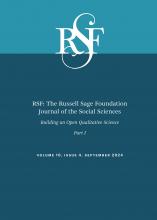Abstract
This article explores the relationships between the American health-care system, trust in institutions, and decision-making processes that have affected COVID-19 vaccine uptake. Findings are based on an analysis of a nationally representative sample of 137 individuals who participated in semi-structured qualitative interviews during the rollout of the first publicly available vaccine in the first quarter of 2021. The vast majority of respondents reported negative experiences with American health care that predated the pandemic, which generated distrust in medical institutions, including hospitals, private health insurance corporations, the pharmaceutical industry, and related government institutions. The article considers the impact of institutional distrust on attitudes about vaccine uptake. Responses fell along a spectrum from vaccine refusal to vaccine acceptance. Sentiment across categories revealed a high degree of hesitancy framed in terms of institutional distrust. The data reveal a complex landscape of beliefs and perceptions, illustrating widespread hesitancy and ambivalence among participants.
- trust
- vaccine
- vaccine hesitancy
- COVID-19
- public health
- health care
- health insurance
- institutions
- medical-industrial complex
- © 2024 Russell Sage Foundation. Casselman-Hontalas, Amy, Dominique Adams-Santos, and Celeste Watkins-Hayes. 2024. “Discourses of Distrust: How Lack of Trust in the U.S. Health-Care System Shaped COVID-19 Vaccine Hesitancy.” RSF: The Russell Sage Foundation Journal of the Social Sciences 10(4): 154–72. https://doi.org/10.7758/RSF.2024.10.4.07. Direct correspondence to: Amy Casselman-Hontalas, at amylcass{at}stanford.edu, Stanford University, 450 Jane Stanford Way, Building 120, Room 160, Stanford, CA, 94305-2047, United States.
Open Access Policy: RSF: The Russell Sage Foundation Journal of the Social Sciences is an open access journal. This article is published under a Creative Commons Attribution-NonCommercial-NoDerivs 3.0 Unported License.






